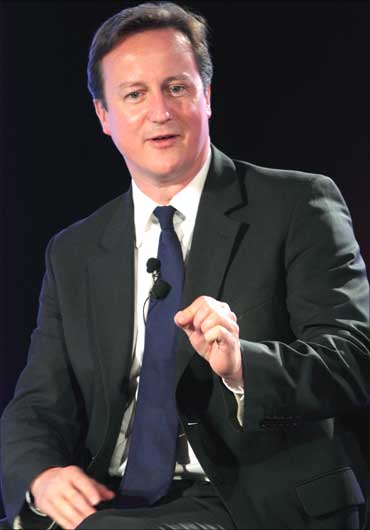
Even though British Prime Minister David Cameron on his first visit to India as the head of state followed the usual protocol - meeting President Pratibha Patil and Prime Minister Manmohan Singh, his agenda was more to do with trade relations than politics.
His huge delegation comprising six Cabinet ministers, including Chancellor of the Exchequer George Osborne, too, talked money, and well, more money... There were 13 chiefs of British universities, also.
If things move as per plan, then a bilateral meeting between the two prime ministers will be held, where Cameron is expected to promote Britain's education and nuclear energy sectors, besides cornering a few lucrative infrastructure deals.
In the afternoon, when Cameron came to Taj Palace Hotel in Chanakyapuri, the bandobast (security arrangements) were so tight in and around the hotel that media person were frisked thrice before being allowed to enter the hotel.
...
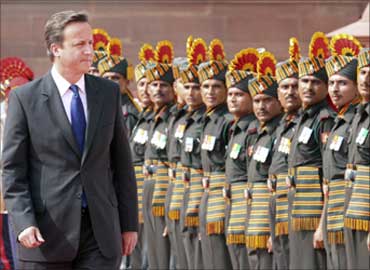
However, not too many corporate honchos were present in the hall.
Naina Lal Kidwai group general manager and country head of HSBC, Rajen Bharti Mittal, chief of Federation of Indian Chambers of Commerce and Industry and Ajit Gulabchand, chairman and managing director of Hindustan Construction Company and couple of other big daddies of India Inc saved the day.
Forty-three year old Cameron entered the hall almost running. His opened his short speech, which was laced with confidence, with a reminder that he was giving special importance to India.
He mentioned how Queen Elizabeth II's speech, that outlined his government's agenda, had specifically mentioned the good relationship that Britain enjoys with India.
In a well-rehearsed televised event he tried to inject some natural air. His youthfulness also touched the audience.
...
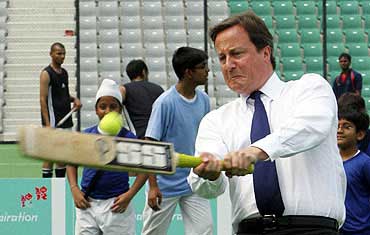
Cameron is not only well-trained for public diplomacy, he is also media savvy, highly energetic and suave.
When confronted with questions on his young age - whether it will prove to be advantageous or the contrary - Cameron dexterously replied by saying positive things both about his age and the coalition government in Britain.
Cameron said the biggest threat to European countries is the issue of public finance. Among the G20 nations Britain, he said, has the highest fiscal deficit.
While Osborne and Cameron explained how they have taken step to cut public spending to control budget deficit, Deputy Chairman of Planning Commission Montek Singh Ahluwalia, Commerce Minister Anand Sharma and HRD Minister Kapil Sibal spoke about the great business potential that exists between the two countries.
In response to Sibal's statement that how millions of Indian students are searching for proper education and how the country is looking for ways to provide schools and training institutes at the cost of crores of rupees, Cameron urged young Indians to opt for British universities for better education.
...
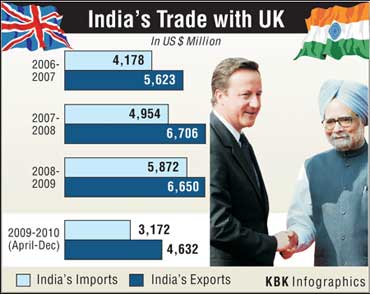
Britain, he said, has plenty to offer.
Listing down the advantages that Britain offers, Cameron said the country has some of the best-run universities, English language, strong financial sector, civil nuclear power sector and time zone which is between Asia and the US. He said, Britain's 'welcoming economy is open.'
While Cameron could convince the Indian audience that he was indeed bullish on building a strong relationship with India, a well-known BBC anchor pointed out that while the prime minster was willing to have a robust relationship with India, his countrymen shared no similar enthusiasm.
Graham Cole, managing director of Agusta Westland said, "People who know India well, like my company, understands business opportunities and issues of Indian society. It will take time but surely interest in India is growing within Britain." Cole said he recently sold helicopters to Ratan Tata.
...
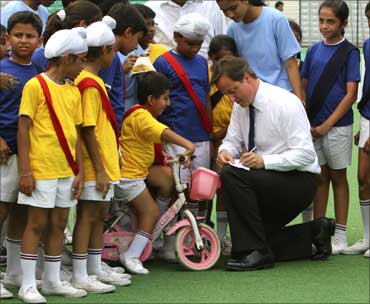
Cameron, who drew flak for Britain's new immigration laws, tried hard to clarify that tight laws and better trade ties are in no way clashing.
A senior British expert of petroleum industry said, "Cameron wants strong business relation with India because it's a well-thought out decision of the British politicians. I think Britain has judged that it's easier to trade with India than China.
Two, they think both will be important countries in future, and, three, this visit of Cameron is to take a hard look at various Indian sectors to decide where Britain can invest. They are still searching for the best business options in India."
Cameron and his men surely meant business.